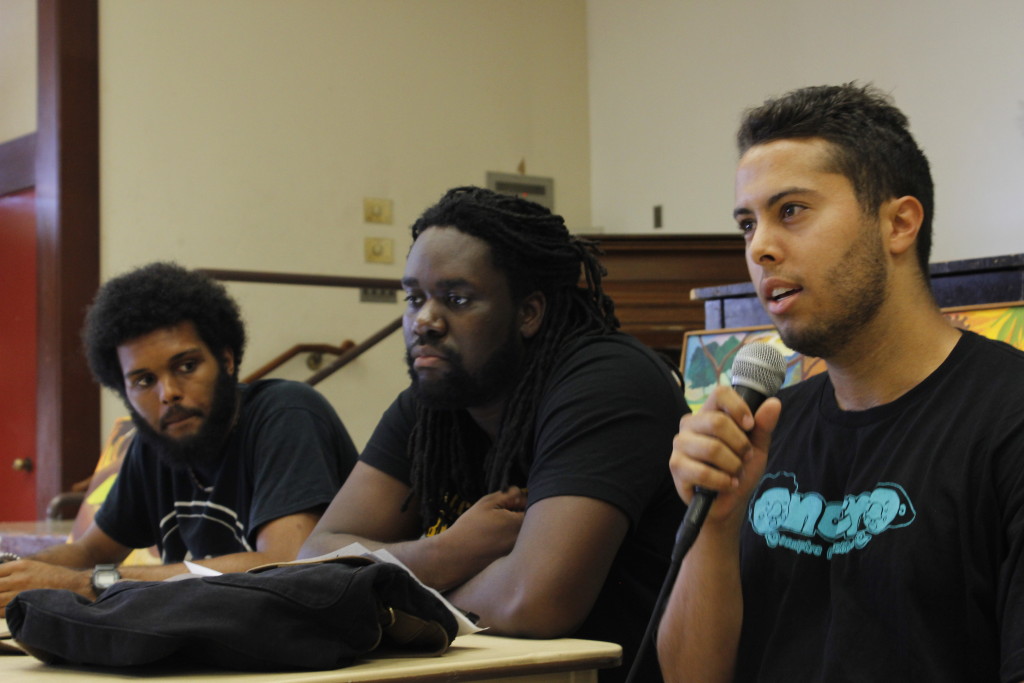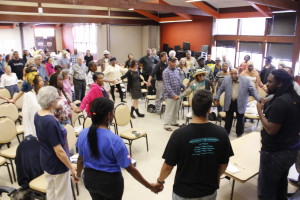Berkeley Activists Call for City Department of Race and Equity
Sep 4, 2015
Posted in Affordable Housing, Berkeley, Community, Education/Schools/Youth, Equal Rights/Equity, Gentrification, Health, Housing/Foreclosures

Marcel Jones, David Turner III and Spencer J. Pritchard, right, speak on Black Lives Matter panel at Berkeley NAACP forum on August 29 at the South Berkeley Senior Center. Photos by Rasheed Shabazz.
By Rasheed Shabazz
Over 100 people gathered at the South Berkeley Senior Center Saturday, Aug. 29 to strategize ways to eliminate racial inequality in the city.
The afternoon program–“Race, Equity, and Gentrification”–featured speakers, a “Black Lives Matter” panel discussion and an open forum.
Organizers proposed creating a Department of Race and Equity in Berkeley and the developing an “African American Holistic Resource Center” to eliminate racism and promote Black healing.
Oakland City Councilwoman Desley Brooks discussed how she introduced the Department proposal during a City of Oakland-sponsored “Black Lives Matter” forum this past winter.
Facing a cold reception when she later introduced legislation to establish the department, she rallied people through social media, events, and teach-ins.
“We kept building an army of support,” she said, explaining the large coalition that grew up in support of the new department.
Following the campaign, the city council unanimously voted to create the department.
Inequities are not always apparent to everyone, said Brooks. To illustrate inequality in Oakland’s zoning practices, she talked about the issue of zoning and the placement of clothing donation boxes.

When city staff proposed restricting locations for the green collection bins, they suggested placing them in Oakland’s flatlands and banning them from the hills and more affluent areas, she said.
“There are all types of things you take for granted,” Brooks said about how the city implements zoning regulations.
To combat unintentional bias in government, Brooks reached out to the Government Alliance for Race and Equity, an initiative affiliated with UC Berkeley’s Haas Institute for a Fair and Inclusive Society.
The national alliance partners with local and regional governments to achieve racial equity.
Following an Adeline Street Corridor meeting the same day, many expressed concerns about gentrification and the further displacement of Black residents from Berkeley.
Berkeley City Councilman Max Anderson said, “Berkeley is becoming a gated community without the gates.”
“We not going to sit by and watch this place be ethnically cleansed and economically cleansed,” he said.
Seniors, youth and people of color, and other people that make Berkeley unique are finding it difficult to remain in the city, Anderson said. “If that (diversity) goes away, the very heart and character of the community goes away.”
For those Black families still in Berkeley, there are unacceptable health inequalities.
“We’re talking about the tale of two cities, one where you’re healthy and thrive and another where you don’t,” said Babalwa Kwanele, a Marriage and Family Therapist. “We are in a state of emergency.”
The Saturday event also featured a “Black Lives Matter” panel discussion, with three UC Berkeley students: Marcel Jones, David Turner III and Spencer Pritchard.
Moni Law moderated the discussion. Other speakers included Berkeley NAACP President Mansour Id-Deen, Dr. Vicki Alexander of Healthy Black Families, and Berkeley Pastor Michael McBride.
Over the past two years, the Berkeley NAACP has led efforts to address racial profiling and discrimination in city hiring. The city hired consultants to review city employee allegations of discrimination.
Based on the findings, the “Mason-Tillman report” recommended five policy changes: auditing Berkeley’s human resources department; improving reporting requirements of applicants, employee turnover, training and Equal Opportunity complaints; creating surveys and focus groups to address the grievance process and retaliation and revising personnel rules; and improving the city’s communications methods.
In response to concerns about racially biased policing, the city has adopted the Fair and Impartial Policing policy. However, the policy has yet to be implemented, and results of data collected have not been released.
Berkeley NAACP Vice President Barbara White concluded the event emphasizing the event was not about getting Black faces in high places, but structural change.
“It’s about systems, not individuals,” White said.
The event was co-sponsored by the Berkeley NAACP, Healthy Black Families, African American/Black Professional and Community Network, the Berkeley/North East Bay Chapter of the ACLU and the East Bay Community Law Center.